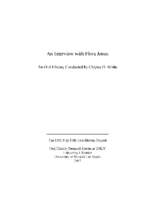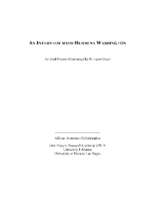Search the Special Collections and Archives Portal
Search Results
Q. B. Bush Papers
Identifier
Abstract
The Q. B. Bush Papers are comprised of Q. B. Bush's personal papers dating from 1957 to 2018 and document Bush's work in Westside Las Vegas, Nevada casinos including the Moulin Rouge, Town Tavern, and the El Morocco. The collection also documents Bush's involvement with the Dealers Security Association and the association's effort to provide better working conditions for African American casino employees. Included are both original photographs and copies of photographs that document the African American casinos where Bush worked, as well as the Bush family at various events.
Archival Collection
Alversa Beals and Essie Henderson oral history interview
Identifier
Abstract
Oral history interview with Essie Henderson and Alversa Beals conducted by Claytee D. White on November 23, 2007 for the African Americans in Las Vegas: a Collaborative Oral History Project. In this interview, Henderson discusses her upbringing in Chatfield, Texas and her family, who were farmworkers. Beals talks about her early life in Sondheimer, Louisiana, moving to Las Vegas, Nevada in 1955, and her employment as a maid at the Flamingo Hilton. Henderson then recalls her first job as a hotel maid, the businesses on the Westside, and describes popular night clubs during the late 1960s. Lastly, Beals and Henderson describe the Welfare Rights Movement that took place in Las Vegas during the 1970s.
Archival Collection

Transcript of an interview with Eva G. Simmons by Claytee D. White, February 4, 2013
Date
Archival Collection
Description
Eva Simmons is a retired educator and school administrator. She has lived in Las Vegas since 1963. In this interview, she talks about Prestige Schools and Sixth Grade Centers.
Text

Transcript of an interview with Flora Jones conducted by Claytee D. White, July 19, 2007
Date
Archival Collection
Description
Interview with Flora Jones by Claytee D. White, July 19, 2007. Jones discusses her upbringing in Mississippi and her employment at the University of Nevada Las Vegas in the Admissions Office.
Text

Transcript of interview with Hermina Washington by B. Leon Green, March 2, 2013
Date
Archival Collection
Description
Hermina Washington discusses growing up in West Las Vegas, her elementary school education and her family. She has worked for the State of Nevada for over 30 years.
Text
Reverend Marion D. Bennett, Sr. oral history interview
Identifier
Abstract
Oral history interview with Marion Bennett conducted by Claytee D. White on July 02, 2009 for the African Americans in Las Vegas: a Collaborative Oral History Project. Bennett discusses the National Association of the Advancement of Colored People’s historic involvement in the integration of casinos and other businesses, schools, and housing. He recalls the Freedom Fund dinners and the protests that were held in Las Vegas, Nevada. He then cites the process of integration in Las Vegas.
Archival Collection
Berna Rhodes-Ford oral history interview
Identifier
Abstract
Oral history interview with Berna Rhodes-Ford conducted by Claytee D. White on September 25, 2018 for the African Americans in Las Vegas: a Collaborative Oral History Project. In this interview, Rhodes-Ford discusses her early life in Terrell, Texas. She talks about the significance of education in her life, attending Southern Methodist University, and going to law school at the University of Texas at Austin. Rhodes-Ford recalls arriving to Las Vegas, Nevada in 2000, working as a judicial clerk for Judge Johnnie Rawlinson, and establishing her own law firm. Rhodes-Ford remembers joining The Links, Incorporated, and Jack and Jill of America. Lastly, Rhodes-Ford discusses her role as President of the Las Vegas Chapter of Jack and Jill of America.
Archival Collection
Dianna and Gerald Davis oral history interview
Identifier
Abstract
Oral history interview with Dianna and Gerald Davis conducted by Claytee D. White on May 6, 2021 for African Americans in Las Vegas: a Collaborative Oral History Project.
Gerald Davis was falsely arrested on a Sunday afternoon in October 1969, leading to a three-day riot in the Black Westside community of Las Vegas. The Davis' discuss this event as well as their respective backgrounds and past experiences living in Las Vegas, including the businesses they supported, the places they visited, and their employment history.
Subjects discussed include: 1969 riot; Jackson Ave; Officer Arrington; Westside School; and Charles Wyatt
Archival Collection
LaVerne Ligon, B. J. Thomas, and Leonard Polk oral history interview
Identifier
Abstract
Oral history interview with LaVerne Ligon, B. J. Thomas, and Leonard Polk conducted by Claytee D. White on July 09, 2012 and July 18, 2012 for the African Americans in Las Vegas: a Collaborative Oral History Project. Ligon, Thomas, and Polk discuss their personal early dancing careers, their varied experiences in Las Vegas, Nevada during segregation, and working for
Archival Collection
